Voters are frustrated with Biden over Gaza. Can Ro Khanna steer them back?
LAS VEGAS – Tanner Hale did not hold back: “We cannot run a campaign that’s wrapped in Bubble Wrap.”
President Joe Biden's unwillingness to have a public discussion about U.S.-Israel policy vis-a-vis the Palestinian death toll in Gaza is fueling consternation among young voters, the 27-year-old Democratic organizer warned.
Climate change, reproductive rights, threats to democracy, are all going by the wayside in the 2024 campaign.
“This is the most difficult job I've ever had personally organizing youth for a cycle,” said Hale, the executive director of the Young Democrats of Nevada.
For much of the roundtable, Ro Khanna, a Biden campaign surrogate and 47-year-old California congressman sat quietly, leaning forward in his seat with his hands clasped. But then Khanna asked whether Biden's State of the Union address made a difference. The president said protecting Palestinian lives must be a priority. “Or did you think it was not enough?” Khanna asked the 10 young Democrats.
Jessica Guerra, 34, jumped in with a rebuff: Voters will not be satisfied until their elected officials show up to talk about what is happening in the Middle East.
Isn’t that what he’s doing there now? Khanna prodded.
“Respectfully, congressman,” Guerra begins. Khanna is not a representative from Nevada, she notes. “You’re not Biden."
Guerra has a point. Biden and Vice President Kamala Harris have come to the state a total of seven times since the Oct. 7 Hamas attack against Israel. The economy, gun violence, health care and abortion rights — all on the agenda. At no point had either of them come to the swing state to discuss the Mideast conflict with voters.
And so Khanna has taken it upon himself to soothe disappointed Democrats, frustrated young voters, embittered Arab Americans and disillusioned progressives in states that will decide the general election, a likely rematch between Biden and former President Donald Trump.
A quasi-Biden campaign official, Khanna operates in a gray area. Khanna is among a group of surrogates the campaign has identified to address dissent, smooth out tensions and, ultimately, steer wayward Democrats back toward the president.
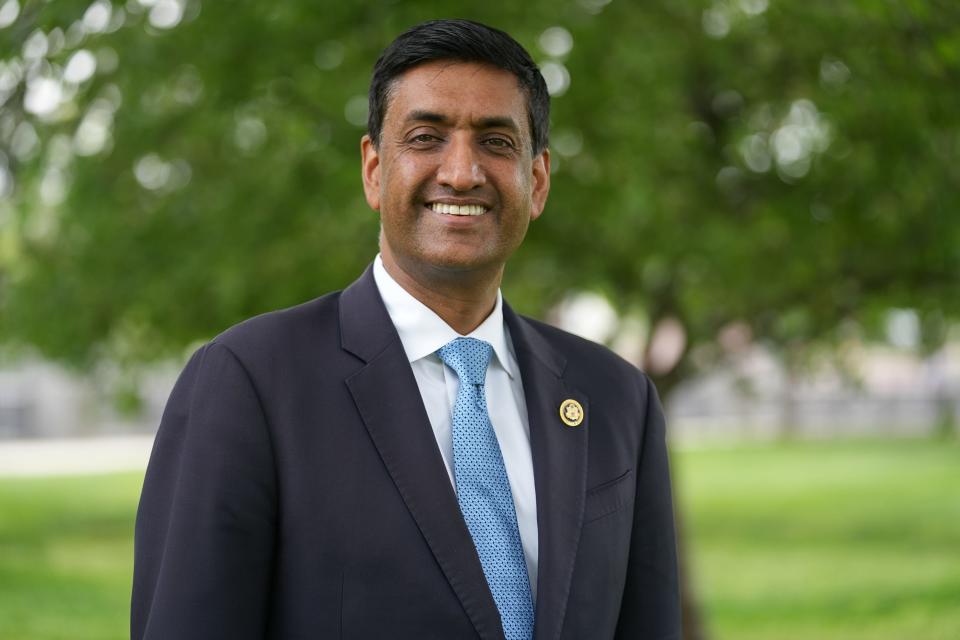
Sometimes he acts as a liaison between the president’s team and pockets of the party’s base. More often than not, he sets up listening sessions for himself with the help of outside political consultants. Khanna insists that all the trips are done in coordination with the Biden campaign. That they wanted him to meet with young people while he was in Nevada.
“This is a thing that the Biden campaign has asked me to do when I go out to these places, is to reach out,” Khanna told USA TODAY during a car ride in Las Vegas from the roundtable with young voters.
It can be hard to tell when Khanna is pitching himself, and when the Biden campaign is asking him to travel. He is always eager to go. Khanna is beginning a campaign-approved college tour for Biden this month in Wisconsin. He’s hopes to add more dates in May.
The Biden campaign says it is in regular communication with his team about travel and events, including the ones in Wisconsin and Nevada and a late February trip to Michigan.
Khanna hoped to quell anger among Arab Americans at the president in Michigan. Community leaders who refused to meet with campaign officials agreed to sit down with Khanna. The congressman, who sits on Biden’s national advisory board, says he was there in a personal capacity. Khanna says he went on his own because he did not want to risk his meetings being canceled.
Then there’s the time Khanna came to the president’s rescue in New Hampshire. Khanna stumped in the state on behalf of an independent write-in campaign when Biden was prohibited by party rules from appearing on the ballot. Again, in his personal capacity.
A former co-chair of Bernie Sanders’ presidential campaign, the Indian American lawmaker has become something of a progressive darling. Fewer people recall that before he was elected, Khanna worked for Barack Obama. He is hardly recognizable outside of Washington – a point that is not lost on Khanna. He readily gave a USA TODAY reporter unfettered access to his schedule in Nevada.
For some in Biden’s orbit, Khanna's moves are attention-seeking. To them, the lackluster enthusiasm the president is experiencing among some voting blocs is not symptomatic of broader divisions inside his base. For the activists and party officials on the ground in the battleground states, however, Khanna’s willingness to pinpoint and address Biden’s weaknesses is a welcome relief.
While Khanna disagrees with Biden on Gaza, he “sends an important signal to people that you can be opposed to Biden's policy, with respect to Israel and Palestine, and still support his reelection in the face of Trump,” former Sanders campaign manager Jeff Weaver said.
There’s no denying the relatively young congressman is testing the waters for a future White House bid of his own. He’s quick to tout his relationship with South Carolina kingmaker and civil rights icon Jim Clyburn. Khanna has an event planned with him in September.
At least he remembered the doughnuts
It was a bitter 25 degrees outside in New Hampshire.
Khanna – who was born in Pennsylvania, did his undergrad at the University of Chicago and got his law degree at Yale – had forgotten his boots. And his gloves. But at least he’d remembered to bring Dunkin’ doughnuts.
A small group affiliated with the Write-In Biden campaign had gathered in the snow at a traffic circle to wave signs supporting the president. Khanna was their star attraction.
Biden had picked a messy fight with the state and was shunning it ahead of the primary. He wasn’t going to appear on the ballot.
Khanna put himself out on a limb. He helped fundraise. He appeared on a call for volunteers. He campaigned in the most frigid part of the state. He bet that Biden would win. And he was right.
Biden won with nearly 80,000 votes.
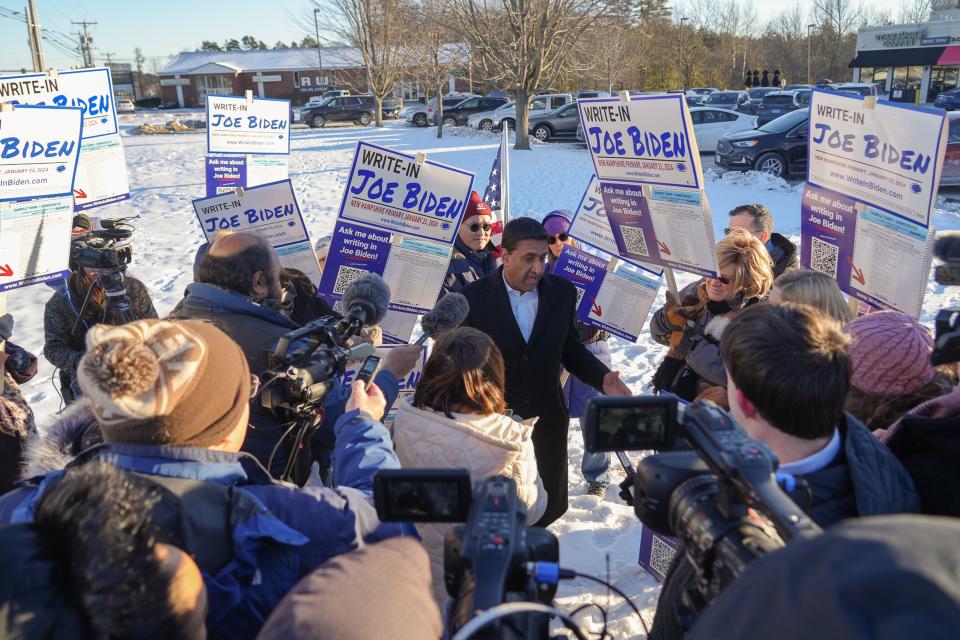
“That was just stupid not to have boots,” the California congressman said. “The gloves didn't really bother me, but the boots, you’re freezing. You freeze. So next time, we'll definitely have boots.”
Bracing the elements wasn't nearly as tough as other challenges Khanna has overcome. He lost his first bid for Congress. A decade later he lost again, before winning on his third try. He was inspired by his grandfather, Amarnath Vidyalankar, who was imprisoned for four years as part of the same movement that landed Mahatma Gandhi in jail. Vidyalankar died when Khanna was a child, but the future lawmaker grew up hearing stories about his fight for Indian independence.
“He's willing to go wherever we need him, not where he just wants to go,” KR Epstein, the Manchester lead for the write-in Biden campaign, said of Khanna.
Khanna is building out an organization similar to the one that won Sanders the state twice – one he knows well, because he was part of it. He’s headlined fundraisers for New Hampshire Young Democrats. He’s done training sessions for their candidates for local office. More than once, he’s been the special guest at major state party functions. He’s stumped for vulnerable lawmakers.
“We're calling him the fifth member of New Hampshire's congressional delegation,” said Jay Bowie, a 26-year-old Manchester resident and president of the New Hampshire Young Democrats.
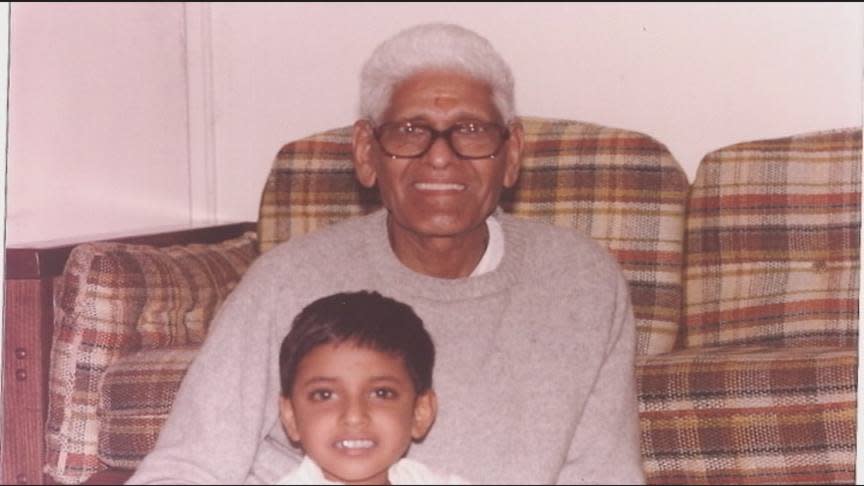
A tougher crowd in Michigan
Khanna found himself staring down a different kind of write-in campaign in Michigan.
Biden had pushed for Michigan to vote earlier during the brouhaha over which state would hold the first Democratic primary of 2024. Now a large portion of the state’s primary electorate, including the only Palestinian American congresswoman, was about to use that power to abandon him over his full-fledged support for Israel.
One of the state’s top elected Democrats, House Majority Floor Leader Abraham Aiyash, met with White House advisers. It didn’t make much of a difference, and Aiyash declined an offer to sit down with Biden’s campaign.
Yet, he agreed to see Khanna. Aiyash said he thought the Democratic congressman could get through to the president’s aides.
Khanna listened and asked questions. Aiyash still voted "uncommitted." But he came away confident that Khanna understood the Biden campaign could not scare people into voting against Trump.
“I think after leaving Michigan, Ro really understood that that is not the case. That the amount of pain and frustration people have had is not something that would go away,” Aiyash said.
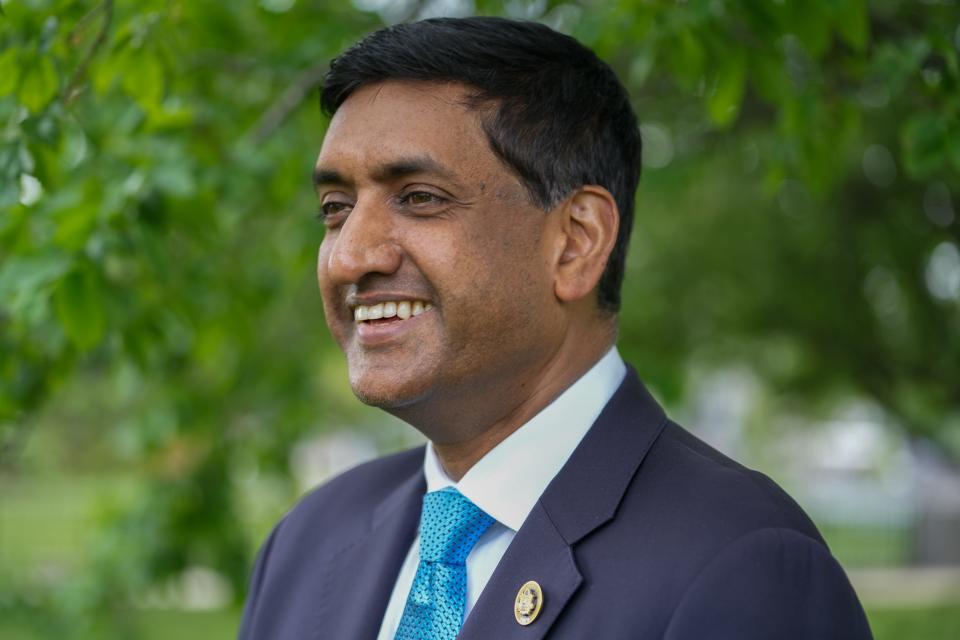
The problem that has the potential to upend 2024 has chased Biden across the Great Lakes region. More than 45,000 people voted "uncommitted" in Minnesota. Nearly 48,000 people voted "uninstructed" in Wisconsin. The protest vote exceeded 100,000 people in Michigan. The president's reelection campaign has responded by downplaying the magnitude of the disapproval.
For these voters, the furor with Biden goes beyond a mere difference in opinion. They see a dissonance between Biden – born almost a year after Pearl Harbor, when Jews were being persecuted by Hitler – and younger generations of Americans. They say Biden’s private outrage at Israeli Prime Minister Benjamin Netanyahu isn’t enough.
Khanna was not initially for an immediate cease-fire. He changed his position early in the war, but not before his political director quit two weeks into his job over the matter.
“He’ll turn an issue over in his mind several times. And he's constantly updating his perspective on it,” said Abdul El-Sayed, 39, a public health professional from Ann Arbor, Michigan, and former gubernatorial candidate.
Congressional Progressive Caucus Chair Pramila Jayapal, one of the earliest U.S. lawmakers to call for a cease-fire, says she spoke to Khanna quite a bit before he backed one.
“We often in the Democratic Party treat young people and our base of progressive voters as if they should just know better and they should just come along and vote for a Democrat because the Republican would be much worse,” Jayapal said. “And I really think that's the wrong approach.”
Jayapal, who actively helped build the progressive coalition for Biden in 2020, said that under the current conditions, it will prove “extremely difficult" to turn them out in November.
“This is the critical issue, and we've got to see a policy shift if we're going to be able to bring back that fragile coalition,” she warned.
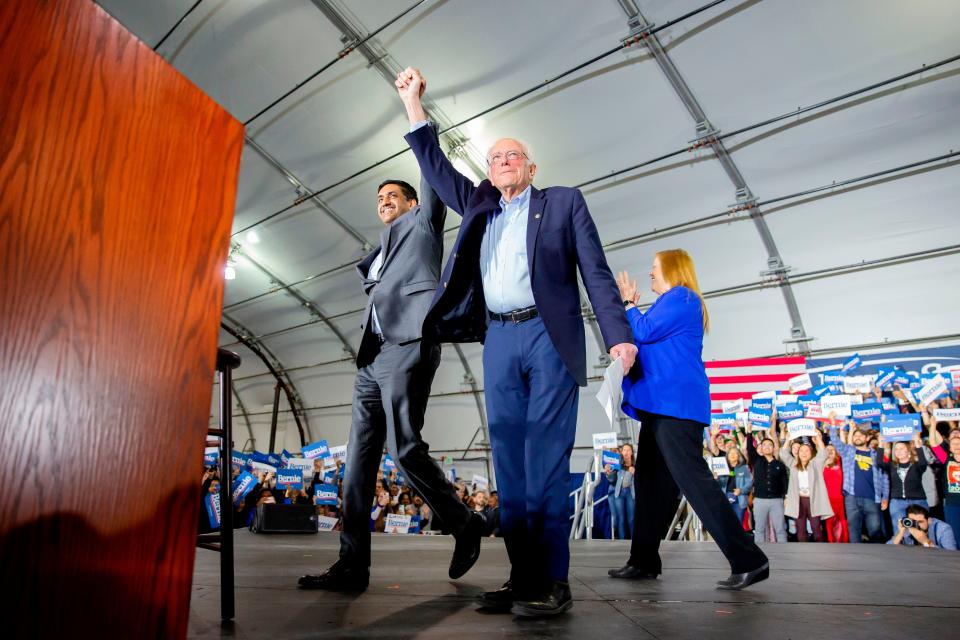
Is Khanna making a difference?
Khanna says he’s seen a shift in Biden’s approach to Israel over the past few weeks. The U.S. allowed a U.N. resolution calling for a permanent cease-fire to move forward by abstaining from the vote.
“I do think the president is getting closer to my position,” Khanna said in the interview.
Biden may not have come as far as young voters want, he told University of Nevada, Las Vegas, students at a cease-fire discussion that took place later that day – but at least he has the sitting president’s ear.
He is in semi-regular touch with Biden himself. Khanna says he talks to the president for a couple minutes every three to four months. He's talked much more extensively to the president’s senior-most advisers.
Khanna said he perceives the "uncommitted" vote in Michigan as “being a wake-up call” for the president on Gaza.
Yet it’s far from settled how the dispute will play out in must-win swing states such as Michigan, Wisconsin and Nevada in the general election.
Nevada will be a bellwether for Biden. The state almost always votes for the presidential winner, and in every current, public poll of the state, Trump is leading Biden.
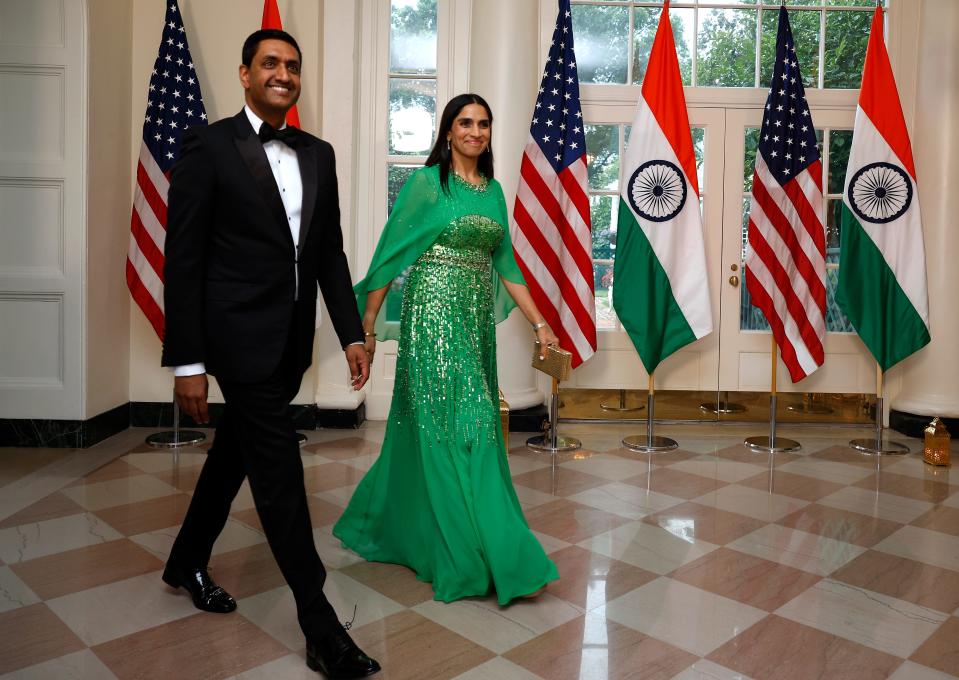
Khanna says Biden’s campaign can’t avoid engaging with young voters on their own turf. The president, vice president and their surrogates should hold open town halls in every college town in America, he says.
Khanna's roundtable with young Democrats in Nevada had more of a focus group feel. His approach has even caught the eye of longtime GOP pollster Frank Luntz.
“He understands, reflects, and communicates progressive voter public opinion better than anyone,” Luntz said in a recent X post.
Harris did a college tour last fall, but her team screened students and handpicked questions that fit with their narrative ahead of the moderated conversations.
Khanna said he'll continue his listening tour, but young voters are insisting on hearing from Biden and Harris: “I mean, look at Obama. Can you imagine if Obama was running in 2012, and he didn't go to college campuses?”
Khanna’s political ambitions
His first official event of the late March trip to Nevada trip was the Shepherd's Breakfast, a monthly gathering of power brokers in the Black faith community. The announcer mispronounced his name.
“Kuh-nay? Kuh-nye? Khanna.” He got it right with some help.
If it bothered Khanna, he didn’t show it.
Khanna recounted how Gandhi’s technique of nonviolent political protest inspired Martin Luther King Jr. King's movement paved the way for the 1965 Immigration Act, which lifted a de facto ban on Asian migration, Khanna explained.
“If it weren’t for the Civil Rights Movement, my parents wouldn’t have been allowed to come to the United States of America,” he said.
The history lesson draws applause. Khanna tells the audience about the fellowships he’s creating for Black students at tech companies and a bill he introduced to prevent private equity firms from buying up homes in their communities.
He closes by telling them that he volunteered on Obama’s very first campaign in Chicago, when the future president was running for state Senate. He later worked for him as a deputy assistant secretary at the Commerce Department. “People don’t realize Obama appointed a lot of people like me in their 30s to give us a shot,” he said.
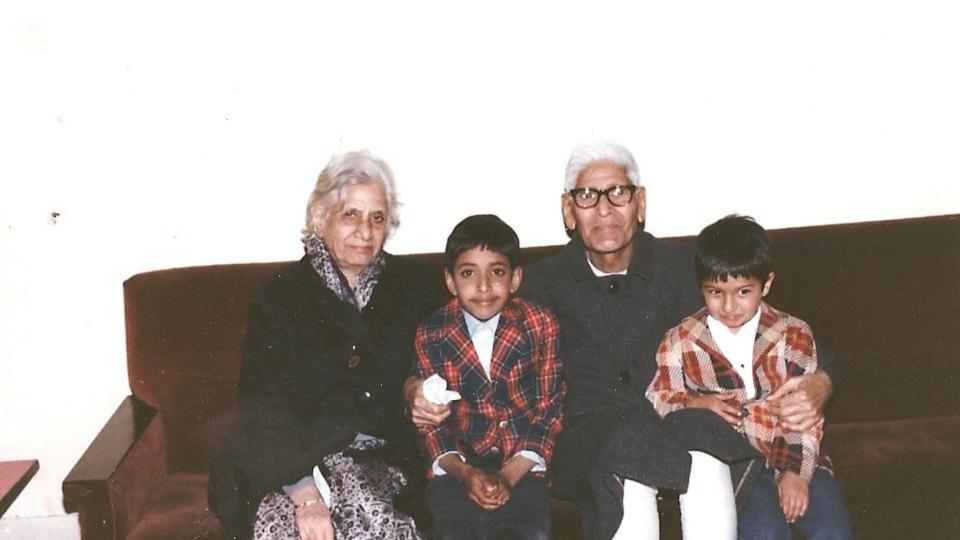
Queana Fleming, a full-time student and single mother, had never heard of Khanna before the Las Vegas breakfast. But she came away impressed.
“When he spoke, he made me feel a little bit better about Biden,” said Fleming, 36.
Although much of the recent focus on Khanna has been on the Israel-Hamas war, he says economic policy is where he’s had the biggest influence on Biden’s agenda.
He was one of the lawmakers standing with Biden at the Chips and Science Act signing celebration on the South Lawn. The law incorporated measures Khanna pushed for to help reduce the trade deficit with China. His work scored him an invitation to Ohio to help Biden promote the legislation.
“Ro is a tireless champion for American innovation and seeing that workers … are part of the deal,” Biden said at the signing.
Rahna Epting, executive director of MoveOn, one of the nation’s largest progressive organizations, noted how Khanna was able to get climate provisions that progressives wanted in the Inflation Reduction Act by working with moderate Sen. Joe Manchin of West Virginia.
“He’s able to lead in a way that doesn't marginalize folks within the party, even though they may not agree with him,” Epting said.
Biden campaign spokesman Charles Lutvak said Khanna has been an "invaluable partner" in talking to voters about issues such as student loan debt, climate change and economic opportunity.
"He is working alongside 50 national advisory board members that will be on the ground campaigning tirelessly across the battlegrounds over the next seven months," Lutvak said in a statement.
Khanna is appealing to much of the same voting bloc that Sanders galvanized in his presidential campaigns. He also attracts former Obama voters and is palatable to Republicans. The Silicon Valley lawmaker's support for TikTok in the face of a potential U.S. ban has also helped to raise his profile with younger voters.
Khanna denied that he’d want a Cabinet position in a second Biden term.
At a house party in New Hampshire, Khanna dodged a question about whether he would ever consider running. “Who know?” he said. “But right now I’m here to support President Biden.”
In Nevada, he said, “I would never rule out anything in life.”
His political ambitions could put him on a collision course with two fellow Californians: Harris and Gov. Gavin Newsom. Khanna said he has a “cordial” relationship with the vice president, and when he and his wife married, she sent him a nice note.
Weaver, who advised Dean Phillips in his bid against Biden but has since endorsed the president, says he encouraged Khanna (and others) to run this year if Biden didn’t.
“I think Ro Khanna would be an incredibly, incredibly strong candidate, in a presidential primary in 2028,” he added.
The first and only House member to leap directly to the presidency was James Garfield more than 143 years ago.
A congressional representative would be an “underdog,” Khanna replied. “But after Obama and Trump, I don’t think there’s any conventional path in politics.”
That description sounds a lot like Khanna. “I've been an underdog in almost everything I've done politically,” he said.
He’ll have to get through the Israel-Hamas war first.
Francesca Chambers is a White House correspondent for USA TODAY. Follow her on X, formerly Twitter, @fran_chambers.
This article originally appeared on USA TODAY: Ro Khanna's 2024 election task: Steer frustrated voters toward Biden
